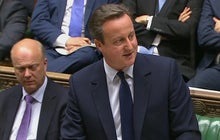begin quote from:
Call it the Redcoats' Revenge: British voters' surprise rejection of the European Union and …
Thanks, Brits: U.S. stocks lose 5.3% in just two trading days
While the long-term consequences of last Thursday's U.K. vote to exit the EU aren't clear, the short term is proving costly to England's former colonies. The S&P 500 shed 37 points, or 1.8 percent, to 2,001, following a brutal Friday in which the index shed 76 points, or 3.6 percent.
The Dow ended Monday day down 260 points, or 1.5 percent, to 17,140, and at one point had plunged 337 points. The Nasdaq lost 114 points, or 2.4 percent, to 4,594.
U.S. stocks have lost a total of $1.2 trillion in value since the Brexit vote, USA Today reported, citing its own analysis of data from Standard & Poor's. The news outlet said more than $300 billion in market value has been erased just from the 30 most-valuable stocks in the S&P 500 -- "the stocks most commonly found in U.S. investors' portfolios," it noted.
Banks and other financial companies fell Monday as investors speculated that the global upheaval caused by Britain's decision to leave the EU will prompt the Federal Reserve to hold off on raising its benchmark interest rate. Banks benefit from higher interest rates, which translate into more revenue from loans and credit cards. The materials and energy sectors also slumped.
Investors should prepare for more damage throughout the week leading up to the Independence Day weekend, experts said.
"When you get major news like this that is unexpected, as the 'Brexit' vote was, it often takes about five trading days to kind of work through the system," said JJ Kinahan, chief strategist at TD Ameritrade.
U.S. investors aren't the only ones who have lost big: London's FTSE has lost 5.6 percent over the past two trading days;
In the wake of the Brexit vote, ratings agency Standard and Poor's stripped the U.K. of its top credit grade, from AAA to AA. S&P said vote is a "seminal event" that "will lead to a less predictable, stable and effective policy framework in the U.K."
Standard and Poor's also cited "risks to the constitutional and economic integrity of the U.K." as Scotland's strong vote to remain in the EU could raise the prospect of another referendum on Scottish independence.
Following the referendum, U.K. Prime Minister David Cameron -- who had campaigned against a Brexit -- announced he'd resign later this year, and that his successor should initiate the formal exit process. But some EU members have publicly pushed for a speedy exit to ease uncertainty. calling for second vote??
Scottish National Party leader Nicola Sturgeon says a new referendum on independence is "highly likely" because of Britain's vote to leave the European Union.









No comments:
Post a Comment